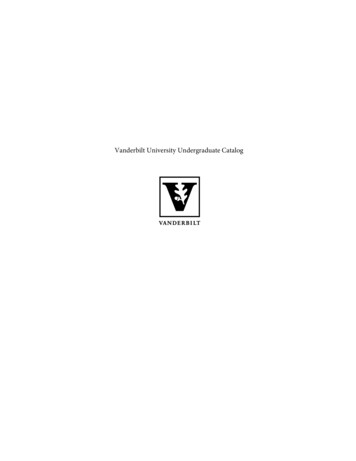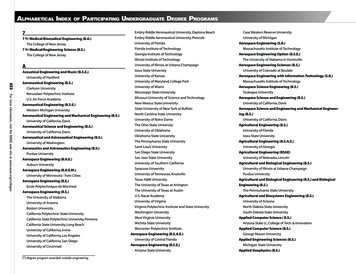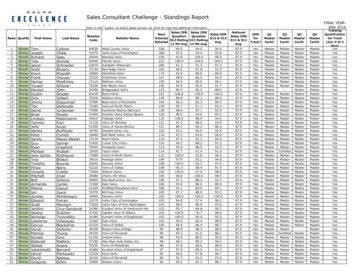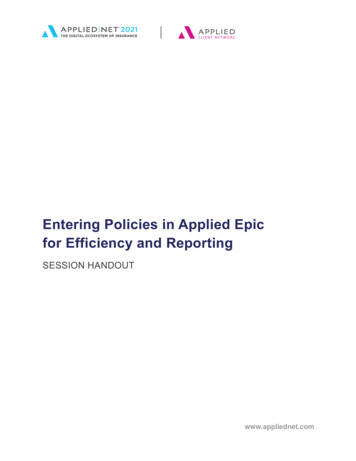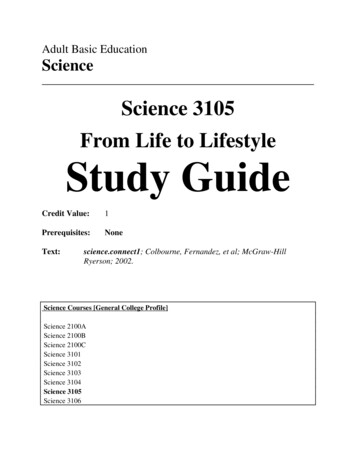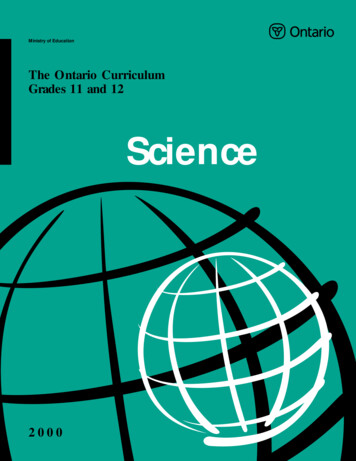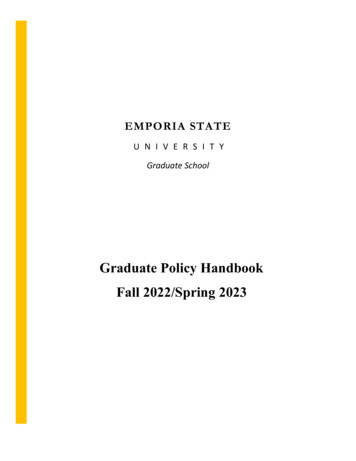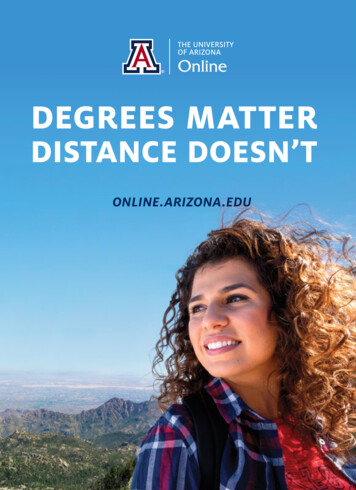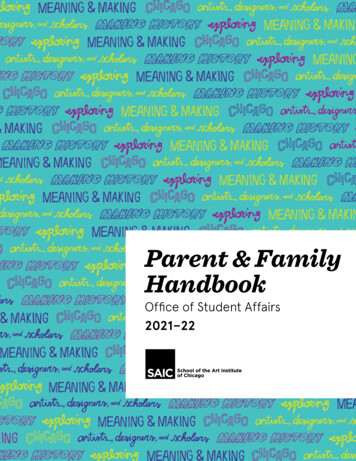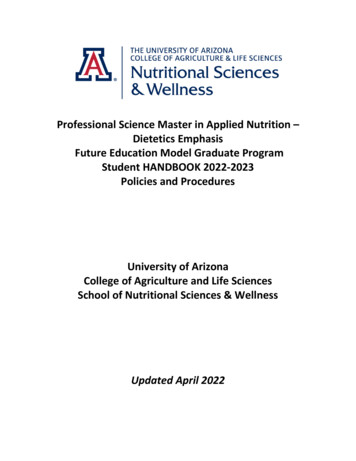
Transcription
Professional Science Master in Applied Nutrition –Dietetics EmphasisFuture Education Model Graduate ProgramStudent HANDBOOK 2022-2023Policies and ProceduresUniversity of ArizonaCollege of Agriculture and Life SciencesSchool of Nutritional Sciences & WellnessUpdated April 2022
WELCOME to the Applied Nutrition – Dietetics Emphasis Future Education Model – Graduate Program(FEM-G) in the School of Nutritional Sciences & Wellness at the University of Arizona. This handbook isdesigned to serve as a resource for you during your time as a student in our program. If you have anyquestions, please do not hesitate to contact us.School Director:Scott Going, PhDSchool Information:1177 E. 4th StreetShantz Building, Room 309Tucson, AZ 85721Phone: 520-621-1187Fax: 520-621-9446nscdept@email.arizona.eduFEM-G Director:Kayle Skorupski, MS, RDN-AP, CNSC, FANDkayleskorupski@arizona.eduFEM-G Coordinator:Kaydi Williams, PSM, RDNkaydiwilliams@arizona.eduGraduate Services Advisorfor Prospective Students:Fanisia Bundage, MAgrad-nsw@email.arizona.edu1
TABLE OF CONTENTSPROGRAM OVERVIEWSchool InformationProgram InformationAccreditation StatusSteps to obtain the RDN credential from the FEM-Graduate ProgramProgram Mission, Vision, and GoalsFacultySemester ScheduleCourse Requirements and DescriptionsProgram Costs3333345679ADMISSION PROCESS INFORMATIONAdmission RequirementsSupervised Experiential Learning Site Selection101010INFORMATION FOR ADMITTED STUDENTSAdvisingProgram CostsSupport ServicesInsurance RequirementsImmunization RequirementsDrug Testing and Criminal Background ChecksSupport ServicesStudent Responsibilities and Professional ConductPrivacyAccess to Personal FilesStudent ComplaintsIdentity VerificationNetID and EmailCatCardD2L BrightSpaceDistance Education RequirementsFinancial AidWithdrawal and Refund of Tuition and FeesAcademic CalendarProgram Schedule, Vacations, Holidays and Leaves of AbsenceMonitoring Student Performance & Student RetentionFormal Assessment of Student Learning and Regular Reports of PerformanceAssessment of Prior LearningSupervised Experiential Learning DocumentationLiability for Safety in Travel to or from Assigned AreasInjury or Illness while in a Facility for Supervised Experiential 2023232424242
Educational Purpose of Experiential and Supervised Practice ExperiencesGraduation, Program Completion & Verification Statement RequirementsConditions for Graduation from FEM-Graduate Program2424253
PROGRAM OVERVIEWSchool of Nutritional Sciences & WellnessThe School of Nutritional Sciences & Wellness leads in cutting-edge research, outstandingundergraduate and graduate programs, Cooperative Extension programs and continuingprofessional education that advance the discovery and translation of nutrition and physicalactivity in optimizing health for people in Arizona, and beyond.Program DescriptionThe Professional Science Masters in Applied Nutrition - Dietetics Emphasis is an ACENDaccredited Future Education Model - Graduate Program. The 12-month program combinesonline coursework through Arizona Online Campus with supervised experiential learning atcommunity, clinical, and food service sites. To become a Registered Dietitian Nutritionist RDN),graduates must complete the required coursework and supervised experiential learning hours(1000 hours). Following completion of the program, a national exam is required as the final stepto earn the RDN credential.Accreditation Status (Required Element 8.3a)The Applied Nutrition – Dietetics Future Education Model Graduate Program (FEM-Graduate) isan accredited program by the Accreditation Council for Education in Nutrition and Dietetics(ACEND). The University of Arizona School of Nutritional Sciences & Wellness houses a DidacticProgram in Dietetics (DPD) delivered at 3 unique campuses (UA Main, UA Yuma, and ArizonaOnline), an Individualized Supervised Practice Pathway (ISPP) is available in two tracks: UAMain- Tucson and a Distance option in addition to the FEM-Graduate Program offered throughArizona Online campus.University of Arizona Applied Nutrition – Dietetics Future Education Model – Graduate Programis accredited by the Accreditation Council for Education in Nutrition and Dietetics of theAcademy of Nutrition and Dietetics, 120 South Riverside Plaza, Suite 2190, Chicago, ILSteps to obtain the RDN credential from the FEM-Graduate Program include: (RequiredElement 8.3d) Minimum of a bachelor’s degree from an accredited university. January 1st, 2024, minimum of a master’s degree from an accredited university. Complete dietetics coursework at a program which has been accredited by theAccreditation Council for Education in Nutrition and Dietetics (ACEND). Complete an ACEND minimum of 1000 supervised experiential learning hours. After completing coursework and supervised experiential learning, are provided averification statement to allow to sit for the national registration examination. Complete and pass a national registration examination given by the Commission on DieteticRegistration (CDR).4
Licensure is regulated at the state level and many states, but not all, require RDNs to belicensed. For more information regarding licensure, please re/licensure-mapContinued education is required for maintaining professional registration (RDN Status), andfor updating and expanding practitioner knowledge and skills.For more information on pathways to earn the RDN n-or-ndtrProgram Mission Vision, and Goals (Required Element 8.3b)The School of Nutritional Sciences & Wellness at the University of Arizona takes a collaborativeand interdisciplinary approach to discovering, integrating, extending and applying knowledgeand skills related to nutritional sciences to prevent disease and to promote optimal nutritionalstatus, health and well-being. The School of Nutritional Sciences & Wellness is housed in theCollege of Agriculture & Life Sciences (CALS).CALS’ purpose, mission and vision are:Purpose:To ensure resilience and health of our communities, people, environments, and economieslocally, regionally, and globally.Mission:To educate students and communities in ways that enable their future success in the regionaland global economies. To develop new knowledge and new technologies to benefit society.Vision:To be the most important driver in Arizona's economy and the world's top college in 21stcentury agriculture, life sciences, and commerce.Mission of the School of Nutritional Sciences & Wellness:To provide outstanding research, graduate and undergraduate programs, and outreacheducation that advances nutrition and physical activity in optimizing health for all people.Graduates from our programs will be imbued with our values and will carry forward the unit’svision in their future endeavors.The FEM-Graduate Program’s mission, goals and objectives are:Mission: To provide advanced knowledge in nutrition and skills in dietetics, to successfullyprepare competent graduates for entry-level practice as registered dietitians/registereddietitian nutritionists in the state and nation.Goals & Objectives: (Required Element 8.3c)*Program outcomes data available upon requestGoal #1: The program will provide graduates a quality education for entry into the workforce innutrition and dietetics.5
1. “At least 80% of program graduates complete program/degree requirementswithin 1.5 years (150% of the program length).”2. “Of graduates who seek employment, 50 percent are employed in nutrition anddietetics or related fields within 12 months of graduation.”3. “80% percent of program graduates take the CDR credentialing exam fordietitian nutritionists within 12 months of program completion.”4. “The program’s one-year pass rate (graduates who pass the registration examwithin one year of first attempt) on the CDR credentialing exam for dietitiannutritionists is at least 80%.”Goal #2: The program will provide graduates supervised experiential learning opportunities todevelop skills, knowledge and beliefs to be successful in the workforce in nutrition anddietetics.1. 80% of program graduates will rate the overall quality of the program as “good”or “excellent.”2. 80% of employers surveyed will rate the program graduates as “good” or“excellent” in preparation for entry level practice in a nutrition or dietetics relatedfield.Applied Nutrition - Dietetics Emphasis FEM-G Program FacultyFEM-G FACULTYCourse(s)Kyle Jones, MSAdjunct Lecturerkylemjones@arizona.eduNSC 501 Statistics for Applied Nutrition IAshlee Linares-Gaffer, MS, RDN, FANDAssistant Professor of Practicealinares@arizona.eduNSC 502 Statistics for Applied Nutrition IINSC 562 Professional Ethics and Best Practices inNutrition Education and CounselingNSC 570 Agriculture and Food Literacy for Nutritionand Health ProfessionalsNSC 693B Professional Experiential Learning inDietetics – Food Service ManagementNSC 509 Advanced Nutrition Metabolism & DiseaseLucia Mosqueira, MS, RDAssistant Professor of Practicelmosqueira@arizona.eduMaria Plant, DCN, RDAssistant Professor of Practice & AssistantDirector Didactic Program in Dieteticsplant@arizona.eduNSC 540 Nutrition InterventionsNSC 542 Advanced Medical Nutrition TherapyNSC 558 Advanced Food Service ManagementNSC 519 Advanced Applied Nutritional Sciences6
Kayle Skorupski, MS, RDN-AP, CNSC, FANDAssistant Professor of Practice & DirectorFuture Education Model – Graduate Programkayleskorupski@arizona.eduKaydi Williams, PSM, RDNFEM-G Program Coordinatorkaydiwilliams@arizona.eduElise Shearer, PhD, RD, LDNAssistant Professor of Practiceeshearer@arizona.eduNSC 562 Professional Ethics and Best Practices inNutrition Education and CounselingNSC 693A Professional Experiential Learning inDietetics – Community NutritionNSC 693C Professional Experiential Learning inDietetics– Medical Nutrition TherapySemester ScheduleSummer: 9 creditsNSC 509 Advanced Nutrition Metabolism & Disease (3)NSC 519 Advanced Applied Nutritional Sciences (3)NSC 562 Professional Ethics and Best Practices in Nutrition Education and Counseling (3)Fall: 11-12 creditsNSC 501: Statistics for Applied Nutritional Sciences I (1)NSC 502: Statistics for Applied Nutritional Sciences II (1)Depending on rotations either:NSC 540: Nutrition Interventions (3)NSC 558: Advanced Foodservice Management (3)NSC 693A: Professional Experiential Learning in Dietetics – Community Nutrition (2)NSC 693B: Professional Experiential Learning in Dietetics – Food Service Management (2)OR:NSC 542: Advanced Medical Nutrition Therapy (3)NSC 570: Agriculture and Food Literacy for Nutrition and Health Professionals (3)NSC 693C: Professional Experiential Learning in Dietetics – Medical Nutrition Therapy (3)Spring: 9 –10 creditsDepending on rotations either:NSC 540: Nutrition Interventions (3)NSC 558: Advanced Foodservice Management (3)NSC 693A: Professional Experiential Learning in Dietetics – Community Nutrition (2)NSC 693B: Professional Experiential Learning in Dietetics – Food Service Management (2)OR:NSC 542: Advanced Medical Nutrition Therapy (3)NSC 570: Agriculture and Food Literacy for Nutrition and Health Professionals (3)NSC 693C: Professional Experiential Learning in Dietetics – Medical Nutrition Therapy (3)7
Course Requirements and DescriptionsNSC 501 – Statistics for Applied Nutritional Sciences (1) This course will introduce the conceptsof research methods with a focus on the varied research conducted in nutritional sciences.Students will be guided through a comprehensive compendium of the elements of researchdesign in order to understand the application of these elements to Applied Nutritional Science.NSC 502 – Statistics for Applied Nutritional Sciences II (1) This course will introduce basicstatistical concepts and applied statistical strategies that are essential for conducting andcritiquing research in nutritional sciences and related fields. The course will be delivered onlinestructured with video lectures, self-check practices, discussion forum, assignments and quizzes.The experiences within the course will provide students the necessary competencies toappropriately summarize data (descriptive statistics) and implement statistical tests (inferentialstatistics) based upon appreciation of research design and data characteristics.NSC 509 – Advanced Nutrition Metabolism and Disease (3) This class will review the multi-facetsof macronutrient metabolism and application to the prevention and development of commonchronic diseases. The clinical applications of nutrient deficiencies and toxicities will also bereviewed. Metabolic alterations associated with obesity, metabolic syndrome, and otherdiseases will be discussed. The application of evidence-based guidelines and research fornutritional interventions will be discussed through weekly readings and assignments.NSC 519 – Advanced Applied Nutritional Sciences (3) This course will advance understanding ofresearch design, methods, and implementation, interpretation of research findings, andadvances in nutrition science research for selected chronic diseases.NSC 540 - Nutrition Interventions (3) This course will provide students with tools andcompetencies for developing, implementing, and evaluating nutrition intervention programs.Course topics include evidence-based behavior change, social determinants of health andwellness, nutrition screening & tools for community settings, using nutrition surveillance datato inform program development, and cultural awareness/bias recognition. Course skill-buildingwill focus on problem identification, conducting needs assessments, developing evidence-basedintervention strategies, evaluating program implementation and effectiveness (includingplanning a budget and seeking/obtaining funding support). Students will select a semester-longcourse project based on their personal interests and that of a collaborating community entity.Students completing this course will be able to apply knowledge of social, psychological andenvironmental aspects of eating and food to formulate food and nutrition services that meetthe needs of individuals, communities and populations.NSC 542 – Advanced Medical Nutrition Therapy (3) This course will review the nutrition careprocess and the application of nutrition science principles in the selection of the appropriatemedical nutrition therapies related to gastrointestinal disorders, cancer, diabetes mellitus,neurological impairment, renal disease, wound healing, and critical illness. The role thatintegrative medicine may play will also be reviewed. A case-based approach will be utilized tofoster analytical and critical thinking skills related to designing nutrition prescriptions and8
interventions as well as redesigning nutrition care plans related to monitoring and evaluation.This course will cover disease prevention and management utilizing lifestyle and nutritiontherapies including oral diet and nutrition support.NSC 558 - Advanced Foodservice Management (3) This course will provide students withknowledge, tools and competencies related to foodservice systems management to preparethem to lead in institutional foodservice management and entrepreneurial roles. Course topicsinclude recipe/menu development and modification; supply and procurement; food productionand service systems; sanitation and safety; quality management; management tools, functions,skills; resource management; and information management and reporting.NSC 562 – Professional Ethics and Best Practices in Nutrition Education and Counseling (3)Students will learn and implement inclusive best practices in nutrition education and counselingto serve diverse audiences in preparation for supervised experiential learning in food, nutrition,and healthcare settings. This course will touch on various theories and best practices inculturally responsive education, counseling, leadership, and communication to help studentsdemonstrate the professional competency required for dietetics professionals by theAccreditation Council for Education in Nutrition and Dietetics (ACEND). Students will completethe course with a deeper understanding of the Code of Ethics for the Profession of Nutritionand Dietetics and practice applications that align with the “core values of customer focus,integrity, innovation, social responsibility, and diversity,” including the influence of personalidentities and biases on practitioner interactions. Students will complete written and oraldeliverables, including self-assessments, reflections, case studies, and targeted educationmaterials. Students will also begin the process of developing their professional digitalportfolios.NSC 570 - Agriculture and Food Literacy for Nutrition and Health Professionals (3) The DietaryGuidelines for Americans provide robust guidance on what types of foods to eat, but the publicis increasingly asking nutrition and health professionals to weigh in on the safety, ethics andenvironmental impact of individual foods and food systems. In this course, students willdevelop knowledge of different agricultural and food production systems and we will alsoexamine the considerations related to nutrition, food safety, environmental sustainability andethics of food production, processing and distribution. We will also examine emerging andcontroversial topics that influence consumer food choices and their adherence to dietaryrecommendations. Students will critically analyze the evidence around common consumerconcerns and beliefs regarding food through completion of case studies, persuasive arguments,and communicating evidence-based recommendations to patients, clients and the public.NSC 693A - Professional Experiential Learning in Dietetics – Community Nutrition (2) Supervisedexperiential learning in a community nutrition professional practice setting to meet therequired competencies and hours required by ACEND to meet the FEM-Graduate programstandards.9
NSC 693B - Professional Experiential Learning in Dietetics – Food Service Management (2)Supervised experiential learning in a food service professional practice setting to meet therequired competencies and hours required by ACEND to meet the FEM-Graduate programstandards.NSC 693C - Professional Experiential Learning in Dietetics – Medical Nutrition Therapy (3)Supervised experiential learning in a clinical nutrition professional practice setting to meet therequired competencies and hours required by ACEND to meet the FEM-Graduate programstandards.Program Costs (Required Element 8.3e)Tuition for the Applied Nutrition – Dietetics program is 950 a credit, plus fees per semester ofenrollment (program is three semesters in length). Tuition rates are listed at:https://bursar.arizona.edu/tuition . All tuition and fee schedules are subject to change fromsemester to semester. In addition to tuition, costs include textbooks, and materials/supplies forsupervised experiential learning.10
ADMISSION PROCESS INFORMATIONThe application for the program is available at the University of Arizona Graduate Collegewebsite: https://apply.grad.arizona.edu/users/loginProgram application fee is 90. The GRE is not required.Program Admissions Requirements (Required Element 8.3f & Required Element 9.1a)Admission requirements for the program include: Bachelor’s Degree Undergraduate GPA of 3.0 or GPA over last 60 units of 3.0 DPD verification statementOR Coursework in: Anatomy & Physiology (2 course series) Biochemistry (requires organic chemistry pre-req) Food Science Nutrition Metabolism Food Service Management OR ServSafe Manager Certification At least two courses in Clinical Nutrition/Medical Nutrition Therapy (mustinclude NCP) - if taken at the university of Arizona the three course MNTseries is required (NSC 325, NSC 425, NSC 435)Supervised Experiential Learning Site Selection (Required Element 8.3k)For distance track students, admission requirements also include identification ofsites/preceptors for medical nutrition therapy, foodservice management and communityrotations, with signed memorandums of understanding submitted at time of application.Locating Preceptors for Distance RotationsWhat are preceptors?A preceptor is an expert or specialist, such as a Registered Dietitian Nutritionist (RDN).However, not all your preceptors must be RDNs. Preceptors should be someone involved withthe field of nutrition and dietetics in some way. They should also be in a position to help guideyour experience in the internship and help arrange experiences. Clinical supervised experientiallearning must have a RDN as a preceptor, however the clinical site does not need to be a largehospital. Skilled nursing facilities with rehabilitation units are a possibility for a clinical site.How to locate preceptorsIt will take effort on your part to locate and identify potential preceptors for your supervisedexperiential learning. Here are some tips for this process: Talk with your advisor or Program Director Attend state and local dietetic association events to network and meet professionalsworking in your area Contact people you have worked or volunteered for previously11
Cold calling facilities (this may be frustrating, but sometimes you are able to make aconnection)o If looking for a foodservice preceptor, ask to speak with the Kitchen or DietaryManagero If looking for a clinical preceptor, ask to speak with the Clinical NutritionManager or Director of NutritionSearch for preceptors https://www.eatright.org/find-an-expert te ShowSearchInformation to share with potential preceptorsIt is important to be organized and professional when making contact with potentialpreceptors. Be sure to introduce yourself and explain that you are planning to apply to adistance track, which means you are responsible for planning your own supervised experientiallearning. You will want to be able to provide them with the following information when askingthem to consider serving as your preceptor: What supervised experiential learning do you want to do under their supervision? How many hours (in weeks) are you requesting to spend with them? When are you requesting to spend time with them, and can you be flexible with thedates? Do you have any unique qualifications that might help you to be more of an asset tothem at their facility (such as bilingual, experience working with veterans, CPRcertification, etc.)?We recommend that you draft a well-formed email to send to preceptors that includes apersonal introduction, your purpose, and the key information listed above.When you have identified your potential preceptors and sites, you will ask them to fill out aMemorandum of Understanding, which you will submit with your application to the program.During application review, appropriateness of sites and preceptors will be reviewed by theprogram coordinator and program director. Once admitted into the program, affiliationagreements will be established.12
ADMITTED STUDENT INFORMATIONAdvisingThe program coordinator serves as the advisor for students enrolled in the Applied Nutrition –Dietetics Emphasis FEM-G program. It is recommended that you contact the programcoordinator at least each semester to facilitate adequate contact regarding progress in courses,questions regarding future coursework and any other academic or personal issues.Program Costs (Required Element 8.3e)Tuition for the Applied Nutrition – Dietetics program is 950 a credit, plus fees per semester ofenrollment (program is three semesters in length). Tuition rates are listed at:https://bursar.arizona.edu/tuition . All tuition and fee schedules are subject to change fromsemester to semester. In addition to tuition, costs include textbooks, and materials/supplies forsupervised experiential learning – see below.Additional costs to students include:Student ID 25AND student memberships(National and state membership 58; districtmembership varies by district)Additional Attire 150 (non-slip shoes, professional wear-dress code variesby site - scrubs, lab coat)Professional Liability Insurance 40 (approximate)Heath InsuranceVariesLaptop Computer 500-1500Drug Testing and Background check 100 (approximate)CPR and First Aid Training*** 110ServSafe Certification 100Parking Permit for UA 100 - 800 (if SEL scheduled on campus)Insurance Requirements (Required Element 9.2a)Professional liability insurance and personal health insurance are required for all students, andproof of insurance must be provided to the program director/program coordinator prior to thestart of the first semester. Students can obtain health insurance coverage through theUniversity of Arizona. Auto insurance is also required, if applicable. Professional liabilityinsurance must cover at least 1 million per incident, 3 million per occurrence.Immunization RequirementsImmunization records and a TB test are required for students before starting the program. Thefollowing vaccinations need to be current: Flu shot, COVID-19 series, Hep B series, MMR,Varicella, Tdap. Varicella vaccination or titer showing immunity is also required.Drug Testing and Criminal Background Checks (Required Element 9.2d)Students need to complete a criminal background check prior to starting the program. Distancetrack students should consult with the program coordinator to discuss the appropriatebackground check for their locations, as this will depend on local government agencies. Some13
rotation sites have additional background check and/or drug testing protocols. It is theresponsibility of the student to communicate with the program coordinator at least 4 weeks inadvance of a rotation to determine if there are any additional human resources requirementsto complete prior to the start of the upcoming rotation.Access to Support Services (Required Element 9.2t)Campus Health: Students have access to Campus Health Services, which provides a variety ofsupport services including: counseling and psychological services, health services, pharmacy,and preventive services. Additional information can be accessed at https://health.arizona.edu/The Office of Scholarships and Financial Aid: Administers aid through a variety of programs. Tobe eligible for financial aid, students must be registered as degree seeking and makingsatisfactory progress toward degree completion. To access financial aid information, see thefollowing website: http://financialaid.arizona.edu/.The Disability Resource Center (DRC): Leads the University in a progressive and proactiveapproach to campus accessibility. Our goal is to ensure that disabled students, employees andvisitors, have a similar, if not identical, experience to that of their non-disabled counterparts. Inaddition to facilitating individual accommodations, DRC works proactively to impact thesystemic design of our campus environments to be seamlessly accessible, reducing oreliminating the need for any individual accommodations or modifications.https://drc.arizona.edu/The Disability Resource Center (DRC) is focused on creating inclusive learning and workingenvironments and facilities through all aspects of the University of Arizona. The accessconsultant for the Graduate College is Jayci Robb and she can be reached at:jacyir@email.arizona.edu.University of Arizona Libraries: The University of Arizona libraries provide resources, servicesand expertise to the University and the local community, the main library website can be foundat http://new.library.arizona.edu/There is a library resource page set up specifically for Applied Nutrition students, please access:http://libguides.library.arizona.edu/gcpsm for more information. This website has the contactinformation for the librarian for the College of Agriculture and Life Sciences, as well as links forinformation that is relevant to graduate students and to online students.Graduate College Support ServicesTo access to Graduate College policies, contacts, information about resources, deadlines andother useful information: http://grad.arizona.eduThe Graduate College has many resources available, for more information entsThe department of Academic Success & Achievement provides a service called SOS (Support,Opportunity, Success). SOS is for UA students who find themselves facing questions or issues14
and are unsure about where to go for answers. Whether you're brand-new to campus or havebeen around for a while, just reach out to SOS for round-the-clock support. Access their websiteto learn more about SOS, or to ask a question: https://sos.arizona.edu/The Graduate and Professional Student newsletter provides up to date information regardingfunding opportunities, employment opportunities, trainings, social events and more. To registerfor the newsletter, please visit: https://arizona.us17.listmanage.com/subscribe?u af018f756d1ccbea4673d3677&id 4c8a27f1fdFor events being held by the Graduate & Professional Student Council, please ent Responsibilities and Professional ConductPlease visit the following link for more information regarding the Student Code of Conduct atthe University of Arizona: esponsibilities/student-code-conduct Also please review the code of academic ies-and-codes/code-academic-integrityImportant Links General Catalog provides comprehensive information related to all academic programsat the University of Arizona: http://catalog.arizona.edu/Responsible Conduct of Research: rIt is the School of Nutritional Sciences & Wellness policy that the student holds finalresponsibility for being aware of and responding to all Nutritional Sciences & We
is accredited by the Accreditation Council for Education in Nutrition and Dietetics of the Academy of Nutrition and Dietetics, 120 South Riverside Plaza, Suite 2190, Chicago, IL . . Director Didactic Program in Dietetics . plant@arizona.edu NSC 519 Advanced Applied Nutritional Sciences : 7 . Kayle Skorupski, MS, RDN-AP, CNSC, FAND
